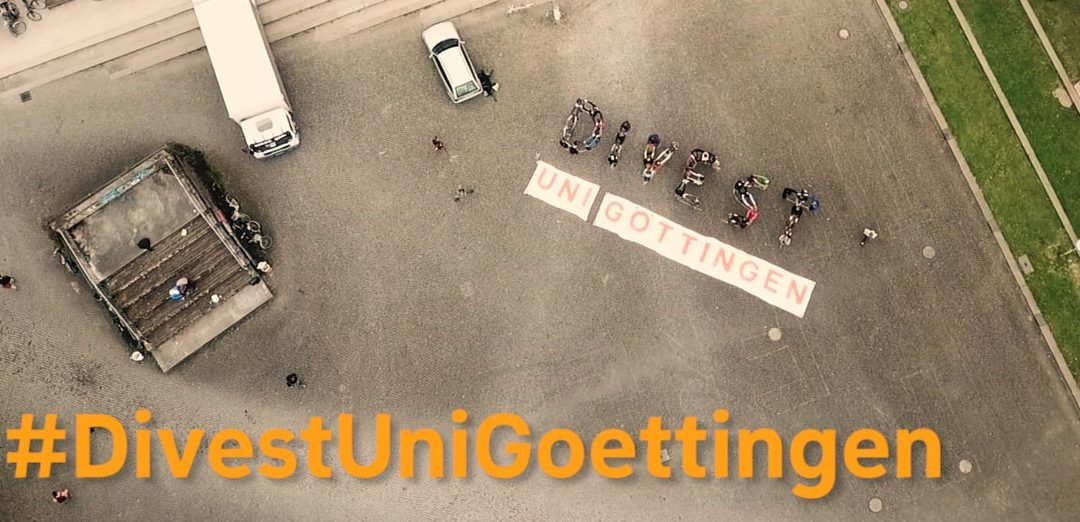World Future Council press release:
The University of Göttingen (Germany) announced on July 17, 2017 that they will end all investments in fossil fuel and nuclear energy industries. The move follows an appeal from students of the university organised by Fossil Free Göttingen, and a similar announcement by the City of Göttingen in May last year.
‘We commend the University of Göttingen for taking this important step to divest from fossil fuels and help protect the climate for current and future generations,’ said Alyn Ware, Disarmament Program Director for the World Future Council.
‘The growing threat to our future posed by climate change has stimulated students to take action,’ says Luisa Neubauer, Communications Officer for Fossil Free Göttingen. ‘The fossil fuel industry has been blocking change to sustainable energy for their own financial interests. We must therefore make it in their financial interests to change. Divestment can help achieve this.’
‘In line with our motto “IN PUBLICA COMMODA – FOR THE GOOD OF ALL”, we not only bear responsibility for the findings of science, but also for how these findings can influence and guide society,’ said President of the University Ulrike Beisiegel. ‘For this reason, we also take on social responsibility for our investments and select them not only according to economic considerations, but also, in particular, using socially, ethically and ecologically sound criteria.’
The decision by the University impacts its investment portfolio of €190 million. Following the decision, the University Stiftung (investment foundation) will not invest in coal, gas or oil companies, nor companies involved in nuclear energy.
However, unlike the City of Göttingen which decided to also exclude nuclear weapons and conventional weapons from its investment policy, the University of Göttingen decided not to exclude these industries.
Nuclear weapons divestment is part of Move the Nuclear Weapons Money, a global campaign initiated in 2016 by the World Future Council and others to cut nuclear weapons budgets, end investments in nuclear weapons and shift these budgets and investments into social, economic and environmentally beneficial enterprises.
‘We had hoped that they would also include nuclear weapons divestment in their recent decision. However, the nuclear weapons divestment campaign is still young, and perhaps the University will follow the example of Göttingen City once they have had experience of implementing their policy with positive result.’, says Mr Ware who is also the Global Coordinator for Parliamentarians for Nuclear Non-proliferation and Disarmament (PNND) and a recipient of the Right Livelihood Award (‘Alternative Nobel Prize’).
‘Nuclear weapons also pose an existential threat to humanity and absorb billions of dollars that are sorely needed for better purposes, such as investment in renewable energy,’ says Ms Neubauer. ‘In times of increasing tension between nuclear-armed countries, a demonstration of financial restraint can help governments step back from the nuclear brink.’
‘The Göttingen City action to divest from fossil fuels and weapons producers is a wonderful follow-up to the example of the Göttingen Eighteen, the group of Nobel laureates and other scientists from Göttingen who in the late 1950s argued against the deployment of nuclear weapons in Germany,’ says Dr Ute Finckh-Krämer, PNND Council Member and an adviser to the Move the Nuclear Weapons Money campaign. ‘The action complements similar divestment actions at State and Federal level. Berlin City, for example, has taken action to exclude investments from city funds in fossil fuel, nuclear energy, nuclear weapons and the conventional weapons industry.’
For more information:
- University of Göttingen new financial investment guidelines
- City of Göttingen financial investment guidelines adopted June 1, 2017
For interviews and all other media enquiries, please contact:
Alyn Ware, Programme Director Peace & Disarmament +420 773 638 867
Miriam Petersen, Media & Communications Manager +49 40 3070914-19

